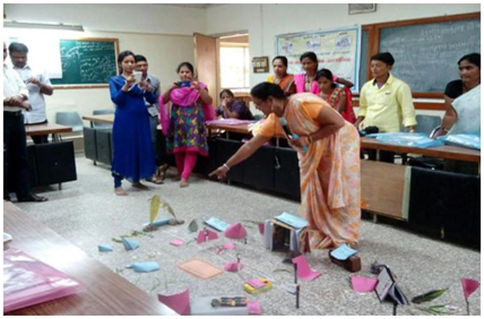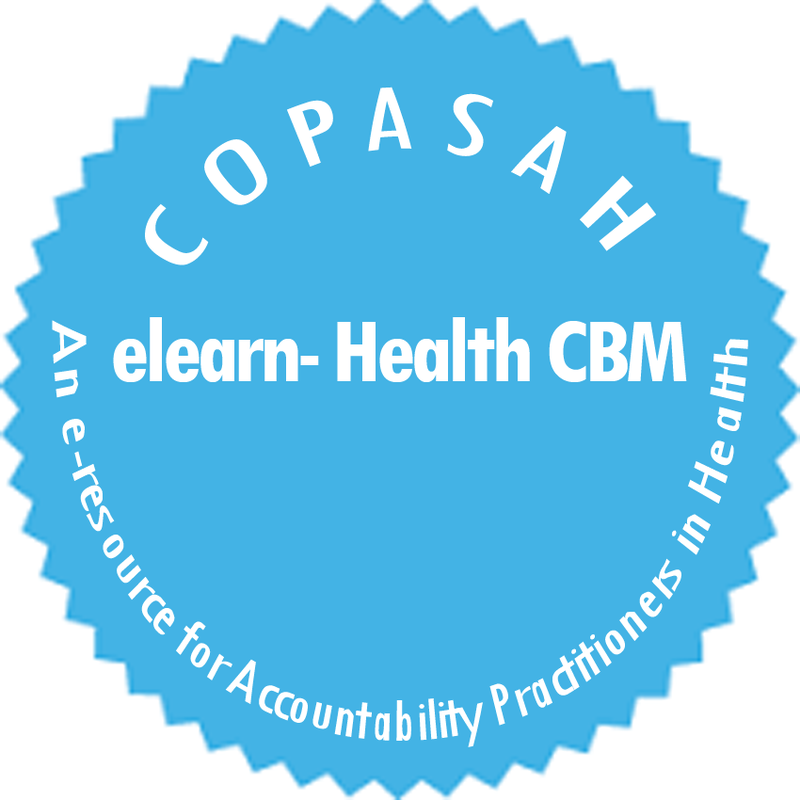
|
|
Strengthening Grassroots Practitioners through Contact and Distance Learning on Health System Accountability
|
Surekha Dhaleta
|
|
COPASAH is a community of accountability practitioners who share an interest for the field of community monitoring for accountability in health. The focus of COPASAH is to enable, support and enhance the capacities of accountability practitioners through mutual learning and exchange, capacity building, sharing of health rights accountability practices and lessons, through knowledge-generation and dissemination at the grass roots. The accountability practitioners use the grassroots knowledge using a bottom-up approach, working upwards to empowering communities towards health rights.
Community engagement of field-based practices helps generate a platform for practitioners to share and exchange their experiences. The resultant is that COPASAH has fostered capacity building of grass-roots practitioners’ by developing and implementing different practitioner and peer led learning strategies in the South Asia region. The learning strategies include training workshops hands-on - experiential learning, opportunities to practitioners such as facilitated exposure visits, learning exchange visits, technical assistance to member organisations in social accountability practices. |
Learning about health system through group exercise in one of the first contact sessions
|
This approach is based on community partnership to promote mutual learning and mentorship. This is veered in a participatory manner so that it enhances shared learning where practitioners can utilize their experiences to strengthen their individual practices and can apply it in their own contexts.
Through this distinctive manner of capacity building at the regional level of community accountability practitioners in South Asia (India) and building a strong ‘community’ of practitioners’, COPASAH has initiated capacity building of grass roots practitioners through a Contact and Distance Learning Certified Course on Health System Accountability for Grassroots Activists in the state of Maharashtra (India) since April 2015. The distance-learning course is anchored by COPASAH and Support for Training and Advocacy to Health Initiatives (SATHI) in collaboration with a social work college, the Karve Institute of Social Services (Maharashtra, India) which has accredited the course. SATHI, based in Pune, works on the issues of health rights, through partnerships with civil society organisations. It facilitates advocacy at the local, district, state and national levels.
Concept and Design of the Contact and Learning course on Health System Accountability
COPASAH espouses a vision of capacity building that is a continuous ongoing process, with sufficient handholding and peer support as a key avenue for learning. Thus the methodology adopted for the course consists of contact sessions (comprising of group work and activity, group discussions, presentations, showcasing films/documentaries), field exercises that includes practical work, as well as distance learning. The student practitioners are regularly mentored so that they can apply the learnings hands-on in their practices and contexts.
The course is offered in the local language, Marathi. This facilitates an easy interaction with the practitioners and strengthens regional solidarity. The contact sessions aim to build a conceptual understanding on various themes such as: right to health care, accountability and community monitoring and planning, determinants/constituents of democracy and participatory planning of health services, importance of regulating the private sector and advocacy. The distance learning courses involve learning from reading and reference materials provided in different modules under the guidance of the mentors. In the practical exercises, students organise participatory monitoring of one health institution. The mentors visit the organisations of the student practitioners and provide guidance to the field activity the mentee is involved in. They maintain regular contact with them, providing the assurance that they are supported through their fieldwork. To diversify and maximize the outreach of the course across the state, it is rolled out across five regions of Maharashtra including the Vidharba (Eastern region); Khandesh and North Maharashtra region, Konkan, Marathwada and Western Maharashtra.
The training session is divided into two parts:
After an initial call made to organizations for the course, 115 practitioners registered for the training from the five regions of Maharashtra 90 students from 40 different organizations attended the first contact sessions held in the three cities of Nagpur, Pune and Nasik respectively. Out of the 90 practitioners who attended the first contact sessions, 41 were female practitioners. The participants for the course were drawn from Community Based Monitoring and Planning (CBM&P) network organizations in Maharashtra. The participants for the course work extensively in rural settings and form a mix of activists, community leaders, student leaders, frontline health workers, elected presidents/vice presidents of Panchayats (Village Councils), community correspondents of Video Volunteers (media organization empowering the marginalized) etc.
First Contact Sessions
The first contact sessions started with a mutual introduction of the participants, following which a written pre-test was conducted to map the basic understanding of the participants on the issue of social accountability and the right to health. Following the introductory rounds the practitioners were oriented to the different technical sessions based on the five Modules (see Table 1: Snapshot of the Modules) to the diverse experiences of accountability and the various approaches and strategies that can be used for grassroots advocacy. The sessions were a mix of presentations, practical sessions, group work, role-play, group discussion, showing film and documentary to allow the practitioners to engage with the subject matter in a participatory manner and also share their concerns and interests. Each day of the contact sessions ended with reflections from practitioners. On the final day of the first contact sessions, a post-test was conducted to map the understanding gained on the themes through different exercises at the contact session.
The consolidated reports of the first three contact sessions can be accessed here:
http://www.copasah.net/uploads/1/2/6/4/12642634/contact_cum_distance_learning__course-sathi.pdf
Modules of the Course on Health System Accountability
Modules on the themes of social accountability in health through the lens of human rights were introduced in the first contact sessions. The modules include a range of thematic topics such as: introductory session on the comcommunity of practitioners: COPASAH, health rights, right to health care, ethics and accountability, community based monitoring, gender equality, patients’ rights violations, health rights violations in private sector, use of photo stories to document experience of violation and use the evidence to negotiate for health rights among others.
Plan and Practice
On the final day of the first contact session, the participants plan individual community-based activities with achievable goals as a way forward. The community-based activities are in the area of public health systems and aspects related to the determinants’ of health and wellness. Activities include:
Practice and Mentorship
After the first contact session, the student practitioners implement the learnings of the sessions practically in the field. Three mentors mentor the student practitioners to pursue field activities. The role of the mentors includes visiting the organizations of the student practitioners to provide them with regular guidance for field level community monitoring activities. In the meetings with student practitioners, the mentors take stock of the progress of the activities that are planned during the contact session. Mentors help the student practitioners to deliberate a set of questions/exercises of the reading material provided to them.
Second Contact Sessions
As a follow up to the first contact session, the second contact sessions were conducted in Pune, Nagpur and Nasik respectively in February. In the second sessions the practitioners shared their experiences through presentations of the field level activities conducted under the guidance of the mentors, besides sharing the insights, learnings and lessons on accountability, health rights, advocacy as experienced through the contact and distance learning course on Health Systems Accountability.
Evaluation and Certification
Based on the summation of the experiences outlined in the second contact session and the practice of the course work carried out by the student practitioners in the field, the student practitioners are honoured with certificates for the completion of the course.
Karve Institute of Social Services accredits the course.
SATHI is further working on the dimensions of the course through documenting the profiles of practitioners, collating case studies of accountability practices from the field as developed by the practitioners, including developing a module on health rights and accountability, which is scheduled for completion in April 2016.
Learning
Enthused by the experience the course allows for practitioners to engage on aspects of social accountability, the student practitioners have taken initiative of creating a Whatsapp group by the name ‘SathiyonkeSathi’ besides developing a Facebook page where regular updates of health rights violations and information on issues surrounding health rights are shared. Across the sessions it discerned that student practitioners have conducted village level meetings to spread awareness on issue of health rights, heath care and other learnings made from the first contact session and on basis of four Modules provided to them for course work learning.
One student practitioner from Sawantwadi, in Sindhudurg District of the Konkan region, shared information on the Whatsapp group about an incident where a poor patient was deprived of treatment in a Trust hospital. One of the student practitioners, a Video Volunteer (VV) community correspondent, shot a film on a dysfunctional sub-centre in Nasik and this video was showcased at a recently held regional public hearing, following which constructive steps were taken to make the health centre functional by the health service providers. Some practitioners have shot videos of a case of immunisation related death in Ghatanji Primary Health Centre of Yavatmal, and this was showcased in a regional public hearing. Due to media advocacy done on the basis of a video shot by another practitioner, also a VV community correspondent , a Medical Officer (MO) has been positioned in a Primary Health Centre in the Vidarbha region. As a result of the social audit (learnt through the first contact session) conducted by practitioners in Kurkheda area in Gadchiroli district of the Vidahrbha region, the untied fund of Village Health and Sanitation Committee (VHSC) was utilized which was lying unutilized.
Conclusion
The process of the contact and distance learning course for practitioners on Health System Accountability is an ongoing one as SATHI is collating the experiences of grassroot practitioners from across the five regions. These initiatives taken by the student practitioners though are in a nascent stage but are emblematic of a growing solidarity network amongst the grassroot practitioners in the region as well that of strengthening accountability practice. It reflects that the mutual learning and handholding of practitioners by peers and mentors has the potential to encourage grassroots communities to negotiate for their health rights
Through this distinctive manner of capacity building at the regional level of community accountability practitioners in South Asia (India) and building a strong ‘community’ of practitioners’, COPASAH has initiated capacity building of grass roots practitioners through a Contact and Distance Learning Certified Course on Health System Accountability for Grassroots Activists in the state of Maharashtra (India) since April 2015. The distance-learning course is anchored by COPASAH and Support for Training and Advocacy to Health Initiatives (SATHI) in collaboration with a social work college, the Karve Institute of Social Services (Maharashtra, India) which has accredited the course. SATHI, based in Pune, works on the issues of health rights, through partnerships with civil society organisations. It facilitates advocacy at the local, district, state and national levels.
Concept and Design of the Contact and Learning course on Health System Accountability
COPASAH espouses a vision of capacity building that is a continuous ongoing process, with sufficient handholding and peer support as a key avenue for learning. Thus the methodology adopted for the course consists of contact sessions (comprising of group work and activity, group discussions, presentations, showcasing films/documentaries), field exercises that includes practical work, as well as distance learning. The student practitioners are regularly mentored so that they can apply the learnings hands-on in their practices and contexts.
The course is offered in the local language, Marathi. This facilitates an easy interaction with the practitioners and strengthens regional solidarity. The contact sessions aim to build a conceptual understanding on various themes such as: right to health care, accountability and community monitoring and planning, determinants/constituents of democracy and participatory planning of health services, importance of regulating the private sector and advocacy. The distance learning courses involve learning from reading and reference materials provided in different modules under the guidance of the mentors. In the practical exercises, students organise participatory monitoring of one health institution. The mentors visit the organisations of the student practitioners and provide guidance to the field activity the mentee is involved in. They maintain regular contact with them, providing the assurance that they are supported through their fieldwork. To diversify and maximize the outreach of the course across the state, it is rolled out across five regions of Maharashtra including the Vidharba (Eastern region); Khandesh and North Maharashtra region, Konkan, Marathwada and Western Maharashtra.
The training session is divided into two parts:
- First contact session: is a three days training programme that provides a basic orientation to the course.
- Second Final Contact Session: summates the experiences of the practitioners. Engagement of mentors is ongoing with the student practitioners with handholding in the periods in between of the two contact sessions.
After an initial call made to organizations for the course, 115 practitioners registered for the training from the five regions of Maharashtra 90 students from 40 different organizations attended the first contact sessions held in the three cities of Nagpur, Pune and Nasik respectively. Out of the 90 practitioners who attended the first contact sessions, 41 were female practitioners. The participants for the course were drawn from Community Based Monitoring and Planning (CBM&P) network organizations in Maharashtra. The participants for the course work extensively in rural settings and form a mix of activists, community leaders, student leaders, frontline health workers, elected presidents/vice presidents of Panchayats (Village Councils), community correspondents of Video Volunteers (media organization empowering the marginalized) etc.
First Contact Sessions
The first contact sessions started with a mutual introduction of the participants, following which a written pre-test was conducted to map the basic understanding of the participants on the issue of social accountability and the right to health. Following the introductory rounds the practitioners were oriented to the different technical sessions based on the five Modules (see Table 1: Snapshot of the Modules) to the diverse experiences of accountability and the various approaches and strategies that can be used for grassroots advocacy. The sessions were a mix of presentations, practical sessions, group work, role-play, group discussion, showing film and documentary to allow the practitioners to engage with the subject matter in a participatory manner and also share their concerns and interests. Each day of the contact sessions ended with reflections from practitioners. On the final day of the first contact sessions, a post-test was conducted to map the understanding gained on the themes through different exercises at the contact session.
The consolidated reports of the first three contact sessions can be accessed here:
http://www.copasah.net/uploads/1/2/6/4/12642634/contact_cum_distance_learning__course-sathi.pdf
Modules of the Course on Health System Accountability
Modules on the themes of social accountability in health through the lens of human rights were introduced in the first contact sessions. The modules include a range of thematic topics such as: introductory session on the comcommunity of practitioners: COPASAH, health rights, right to health care, ethics and accountability, community based monitoring, gender equality, patients’ rights violations, health rights violations in private sector, use of photo stories to document experience of violation and use the evidence to negotiate for health rights among others.
Plan and Practice
On the final day of the first contact session, the participants plan individual community-based activities with achievable goals as a way forward. The community-based activities are in the area of public health systems and aspects related to the determinants’ of health and wellness. Activities include:
- Organizing awareness programmes on guaranteed health services, health and sanitation in the village and primary health centre through poster exhibition, corner meeting, and data collection.
- Monitor village level public health services in association with the community .
- Organise Gramsabha (Elected Village Council meeting) for village level public health worker planning.
- Conduct meetings with Auxiliary Nurse Midwife (ANM) on vaccination programme. Conduct discussion groups to emphasise the importance of vaccination, responsibilities of the ANM.
- Conduct Health rights awareness activity.
- Conduct meetings with Self Help Group (SHG) members to discuss the health services offered at the village and sub centres.
- Discuss the utilization of VHND funds at the Village Health Nutrition Day (VHND).
- Organise public hearing at the Primary Health Centre level
- Conduct Village meetings on providing 10% bed facilities for poor patients in trust hospitals.
- Hold Poster exhibition in villages and provide information to the community in villages about patient rights and doctor- patients relationship as well on malpractices in private hospitals.
- Develop video clippings and photo stories on issues related to the violation of health rights.
Practice and Mentorship
After the first contact session, the student practitioners implement the learnings of the sessions practically in the field. Three mentors mentor the student practitioners to pursue field activities. The role of the mentors includes visiting the organizations of the student practitioners to provide them with regular guidance for field level community monitoring activities. In the meetings with student practitioners, the mentors take stock of the progress of the activities that are planned during the contact session. Mentors help the student practitioners to deliberate a set of questions/exercises of the reading material provided to them.
Second Contact Sessions
As a follow up to the first contact session, the second contact sessions were conducted in Pune, Nagpur and Nasik respectively in February. In the second sessions the practitioners shared their experiences through presentations of the field level activities conducted under the guidance of the mentors, besides sharing the insights, learnings and lessons on accountability, health rights, advocacy as experienced through the contact and distance learning course on Health Systems Accountability.
Evaluation and Certification
Based on the summation of the experiences outlined in the second contact session and the practice of the course work carried out by the student practitioners in the field, the student practitioners are honoured with certificates for the completion of the course.
Karve Institute of Social Services accredits the course.
SATHI is further working on the dimensions of the course through documenting the profiles of practitioners, collating case studies of accountability practices from the field as developed by the practitioners, including developing a module on health rights and accountability, which is scheduled for completion in April 2016.
Learning
Enthused by the experience the course allows for practitioners to engage on aspects of social accountability, the student practitioners have taken initiative of creating a Whatsapp group by the name ‘SathiyonkeSathi’ besides developing a Facebook page where regular updates of health rights violations and information on issues surrounding health rights are shared. Across the sessions it discerned that student practitioners have conducted village level meetings to spread awareness on issue of health rights, heath care and other learnings made from the first contact session and on basis of four Modules provided to them for course work learning.
One student practitioner from Sawantwadi, in Sindhudurg District of the Konkan region, shared information on the Whatsapp group about an incident where a poor patient was deprived of treatment in a Trust hospital. One of the student practitioners, a Video Volunteer (VV) community correspondent, shot a film on a dysfunctional sub-centre in Nasik and this video was showcased at a recently held regional public hearing, following which constructive steps were taken to make the health centre functional by the health service providers. Some practitioners have shot videos of a case of immunisation related death in Ghatanji Primary Health Centre of Yavatmal, and this was showcased in a regional public hearing. Due to media advocacy done on the basis of a video shot by another practitioner, also a VV community correspondent , a Medical Officer (MO) has been positioned in a Primary Health Centre in the Vidarbha region. As a result of the social audit (learnt through the first contact session) conducted by practitioners in Kurkheda area in Gadchiroli district of the Vidahrbha region, the untied fund of Village Health and Sanitation Committee (VHSC) was utilized which was lying unutilized.
Conclusion
The process of the contact and distance learning course for practitioners on Health System Accountability is an ongoing one as SATHI is collating the experiences of grassroot practitioners from across the five regions. These initiatives taken by the student practitioners though are in a nascent stage but are emblematic of a growing solidarity network amongst the grassroot practitioners in the region as well that of strengthening accountability practice. It reflects that the mutual learning and handholding of practitioners by peers and mentors has the potential to encourage grassroots communities to negotiate for their health rights
|
|
COPASAH acknowledges the initiative of SATHI to roll out the course for grassroots practitioners in the state of Maharashtra (India). Thanks are due to Bhausaheb Aher, project coordinator of the course for successfully completing the contact sessions and training in the course.
ABOUT AUTHORS
Surekha Dhaleta, is a team member of COPASAH Communication hub and also supports the COPASAH Global Secretariat team. Apart from coordinating the Communiqué with the team she coordinates some of the COPASAH –COPASAH listserve, social media and COPASAH blog. She is associated with the Public Health Rights and Accountability (PHRA) team at CHSJ. She has experience in public health and journalism. To know more about the work of CHSJ and COPASAH please visit, www.chsj.org and www.copasah.net
Surekha Dhaleta, is a team member of COPASAH Communication hub and also supports the COPASAH Global Secretariat team. Apart from coordinating the Communiqué with the team she coordinates some of the COPASAH –COPASAH listserve, social media and COPASAH blog. She is associated with the Public Health Rights and Accountability (PHRA) team at CHSJ. She has experience in public health and journalism. To know more about the work of CHSJ and COPASAH please visit, www.chsj.org and www.copasah.net








